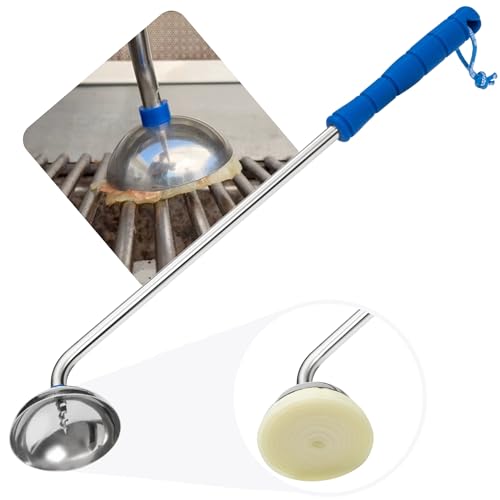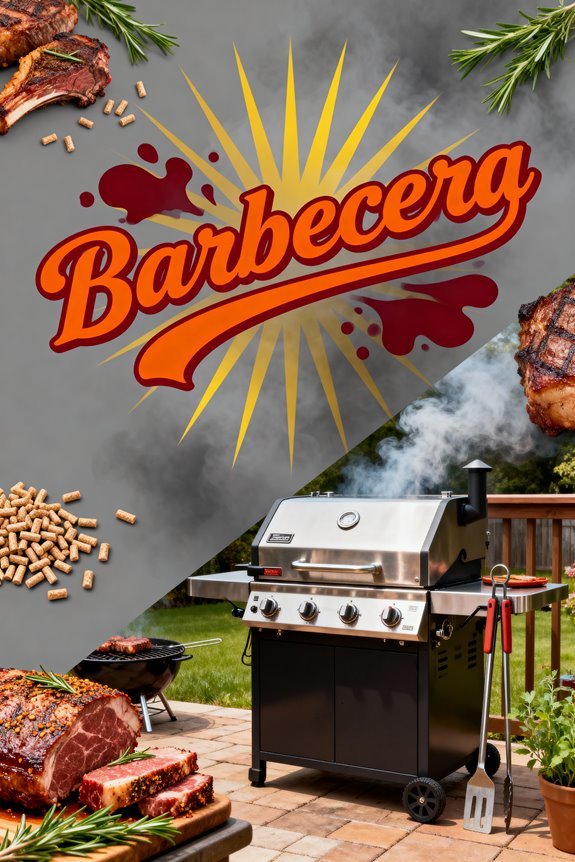To clean your BBQ grill with an onion, preheat your grill to medium-high heat, then cut a large yellow or white onion in half perpendicular to the root end. Using a grilling fork or heat-resistant gloves, press the cut side firmly against the hot grates and scrub in bidirectional strokes. The onion’s natural acids and moisture will loosen carbonized residue while its fibrous structure provides gentle abrasion. This method works best for regular maintenance cleaning after each cookout, effectively removing light carbon buildup without chemical residues or wire bristle contamination risks. Proper technique and timing maximize results.
Why Onions Work as Natural Grill Cleaners
Onions function as effective natural grill cleaners through a combination of moisture, mild sugars, and mechanical action. When you rub a halved onion across hot grates, its juice loosens light carbon deposits and food particles, making debris easier to remove. The moisture acts as a gentle abrasive while natural sugars help dissolve minor stuck-on residues. These onion properties make it ideal for regular maintenance cleaning after each grilling session. For best results, heat your grill to 400 degrees Fahrenheit before cleaning to help soften debris.
Unlike commercial products, this method delivers chemical-free results without risk of harmful residue or wire bristle contamination. The technique works best on cast iron, steel, and enameled surfaces. While onion lacks the citric acid strength of lemon for heavy grease removal, it remains among the safest natural cleaners for routine grill upkeep between more intensive cleaning sessions. For tougher buildup, combining onion with baking soda paste can enhance cleaning power. This approach is particularly effective for light carbonization on grill surfaces.
What You’ll Need to Get Started
Gathering your tools before heating the grill streamlines the cleaning process and guarantees safety throughout the procedure. You’ll need a large, firm onion—yellow or white onion types provide ideal surface area and natural acidity for effective scrubbing. Secure the onion half with a grilling fork or specialized holder like GrillFloss to maintain control during application. Heat-resistant gloves protect your hands when working with hot grates, while a metal scraper removes heavy carbonized residue beforehand. Keep a grill brush nearby for stubborn debris that requires additional attention. For maximum cleaning efficiency, prepare warm soapy water, clean towels, and cooking oil for post-cleaning seasoning. Optional items include baking soda for persistent stains and protective eyewear during vigorous scrubbing sessions. The sulfur compounds in the onion create a non-stick surface that helps remove grime without requiring chemical cleaners. Regular maintenance tasks like this help prevent the buildup of food residue and grease that can attract pests over time. Consider cleaning your drip pans regularly to prevent potential grease fires and ensure optimal grill performance.
Preparing Your Grill for Onion Cleaning
Proper preparation establishes the foundation for effective onion-based grill cleaning and prevents potential safety hazards during the process.
Begin with thorough grill inspection, examining grates for excessive grease buildup, carbon deposits, or rust requiring pre-treatment. Verify your grill is completely disconnected from power or gas sources before proceeding. Remove grates, heat deflectors, and drip pans for separate attention. Empty grease traps to prevent flare-ups. Using a specialized grill cleaner helps break down tough residue before scrubbing. Consider setting aside clean portions for safe freezing of any leftover grilled foods.
Execute debris removal by scraping loose ash and charred particles with a grill scraper. Brush grates lightly to eliminate dry residue without damaging surfaces. Position your grill on stable, level ground in a well-ventilated area. Heat grates briefly to loosen stubborn grease, then cool to a handleable temperature. For gas grills, monitor the flame color to ensure your burners are functioning properly before beginning the cleaning process. Secure grates firmly for applying adequate pressure during onion application.
Best Practices for Maximum Cleaning Effectiveness
Understanding these advantages positions you to implement the method with maximum efficiency through proper technique execution. Begin with onion selection—choose firm, dense bulbs that provide structural integrity during scrubbing. Pre-heat your grill to loosen carbonized residue, then halve the onion perpendicular to the root end for prime surface contact. Execute bidirectional strokes across grates, applying moderate pressure to dislodge debris without compromising grid integrity. Concentrate efforts on high-traffic zones where protein and fat accumulation concentrates. For enhanced efficacy, incorporate coarse salt by dipping the cut surface before application. The onion’s natural acidity helps break down stubborn residue while simultaneously preventing rust formation on metal surfaces. For heavy rust buildup, consider a vinegar soak before the onion treatment to ensure thorough cleaning. Establish consistent cleaning frequency—ideally after each grilling session—to prevent stubborn buildup formation. Post-cleaning protocol requires brushing residual particles and applying a thin oil coating to maintain grate seasoning and inhibit oxidation. For particularly tough grime, consider using Bar Keepers Friend as a supplementary cleaning agent after the onion treatment.
When to Use Onions vs. Other Cleaning Tools
Selecting the best cleaning method requires evaluating your grill’s current condition, material composition, and your performance priorities. You’ll find onions most effective for routine maintenance and light-to-moderate residue on stainless steel or cast iron grates. Their natural acidity eliminates onion residue concerns while preventing chemical contamination. The antibacterial properties of onion juices also help sanitize the grates during cleaning. However, when you’re facing heavy carbon buildup or extended cleaning frequency intervals, bristle-free stainless steel brushes deliver superior mechanical removal without bristle hazards. Reserve chemical cleaners for deep restoration projects on compatible materials, ensuring thorough rinsing afterward. You should avoid wire brushes entirely due to ingestion risks from detached bristles. For delicate or enameled surfaces, onions provide gentle cleaning without surface degradation. Consider onions your primary tool for post-cook maintenance, complemented by specialized equipment for intensive cleaning sessions. Maintaining your grill at proper temperatures between 225°F and 250°F during cooking can help prevent excessive food residue buildup in the first place. For optimal results, preheat your grill to high heat around 500-550°F before any cleaning method to help loosen stubborn debris.
Common Mistakes to Avoid
While choosing the right cleaning tools sets you up for success, improper technique undermines even the best equipment. Common onion mistakes include cutting the bulb too thinly, which compromises structural integrity during scrubbing, and failing to use the freshly cut surface where enzymatic action is strongest. Grill cleaning errors often stem from inadequate preheating—the grill must reach 400°F to activate the onion’s natural acids effectively. Don’t attempt this method on heavily carbonized surfaces; onions excel at light-to-moderate residue removal, not deep degreasing. Always clear large debris beforehand and apply consistent pressure during scrubbing. Regular cleaning helps prevent iron oxide buildup that can contaminate food with metallic flavors. Remove all burnt onion fragments immediately post-cleaning, as they’ll carbonize onto grates. Finally, follow up with proper seasoning to restore the cooking surface’s protective layer. Unlike indirect heat cooking, this cleaning method requires direct contact between the onion and the hot grates for maximum effectiveness.
Maintaining Your Grill Between Cookouts
Consistent post-cookout maintenance extends your grill’s lifespan and guarantees peak performance for every session. After each use, burn off residue by heating on high for 10–15 minutes with the lid closed. Brush warm grates immediately using a grill brush or foil ball to remove particles. Empty your drip tray frequently to prevent grease fires and odors. Similar to a nonmetallic pad used on indoor grills, avoid abrasive cleaning tools that could damage the grates. Deep cleaning before summer ensures your grill is ready for the peak BBQ season.
Apply these grill maintenance cleanliness tips regularly: oil grates every couple of weeks with vegetable oil to prevent rust, particularly on cast-iron surfaces. Cover your grill when not in use to protect against weather and pests. Every 10–12 cookouts, perform deep cleaning by removing grates, brushing the interior, and replacing drip pans. For stubborn buildup, create a degreasing solution using hot water mixed with dish soap and grill cleaner. Check propane connections and burner functionality before grilling sessions to guarantee safe operation and maximum heat distribution.
[affiai keyword=”grill cleaning tools and accessories” template=”carousel” count=”3″










